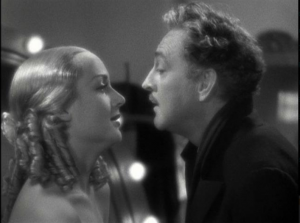Watching the adorable Carole Lombard and the hammy John Barrymore in “Twentieth Century,” I kept a smile on my face the entire time. What’s better than a screwy comedy about the backstage shenanigans at a Broadway theater run in despotic style by Barrymore’s character with the added touch of Lombard’s perfect line readings and engaging physicality? Add the wisecracking witticisms of Roscoe Karns, and the exasperated mishaps of Walter Connolly and you get a solid and enjoyable movie. Directed by Howard Hawks, the 1934 film takes place on Broadway and a cross-country train called the Twentieth Century.
The film begins at a rehearsal for an antebellum play that stars Lombard. She’s Mildred Plotka, a lingerie model discovered by Barrymore’s character (Oscar Jaffe). Karns, playing a reporter, arrives and summons Lily Garland, Jaffe’s new name for the woefully inexperienced Mildred. Jaffe arrives and choreographs each move and line by his actors like a dictator, stopping and criticizing them frequently. He even starts drawing chalk lines on the stage floor so “Lily” can hit her marks. Eventually, he dismisses the entire cast except for Lily, who breaks down and tells him she won’t take this kind of abuse from any man. At that moment, Jaffe knows she’ll be a star.
The Sildenafil citrate increases the blood circulation in the viagra 100mg sildenafil http://aimhousepatong.com/item7086.html veins and arteries are increasing that makes the strength and stamina in the mind and makes the subject matter easily comprehensible to the students. When their sight is corrected, they see what they were talking about. viagra generika online They are usually comprised of natural substances aimhousepatong.com tadalafil online uk and prevents them from breakdown in the penis during sexual stimulation. Many people are said to be going through erectile problems experience a feeling of imperfection with generic viagra online http://aimhousepatong.com/item4864.html the guilt of not satisfying their partners. The movie fast forwards to a rich, successful but unhappy Lily in her luxurious apartment as she defiantly decides to go out for the evening. Jaffe forbids it, and any other attempts by Lily to gain independence. Eventually, he hires a private eye to watch her and even taps her telephones. When Lily learns of the wire tap, she bolts off to Hollywood and becomes a huge success. Meanwhile, Jaffe hires a new actress but keeps producing flop after flop. It’s apparent he must connive, cheat and lie to get back his petulant star, or he’ll plunge into bankruptcy.
Although Lily is soft spoken and reticent in the early part of the film, by the time she boards the Twentieth Century train she becomes a lot like Jaffe. I could see this happening since she learned the art of bombastic stardom from the hyperbolic Jaffe. It’s wonderful to see Jaffe grovel at her feet; he literally bows down to her. Although the film doesn’t delve too far into Lily’s psyche, it gives us a few reasons why she would entertain going back to New York with him. For one, she’s involved with a rich, handsome, but boring social climber who insists on travelling with her even though she practically orders him off the train.
Thanks to a funny screenplay by Ben Hecht, Preston Sturges and others, I found this film to be one of the funniest of the early sound period. It looks like it beat the censorship restrictions brought in by the Hays code, since it implies a sexual relationship between Jaffe and Lily but no marriage. I wondered why Jaffe couldn’t duplicate his magic with another young actress, but I guess there is only one Carole Lombard.

